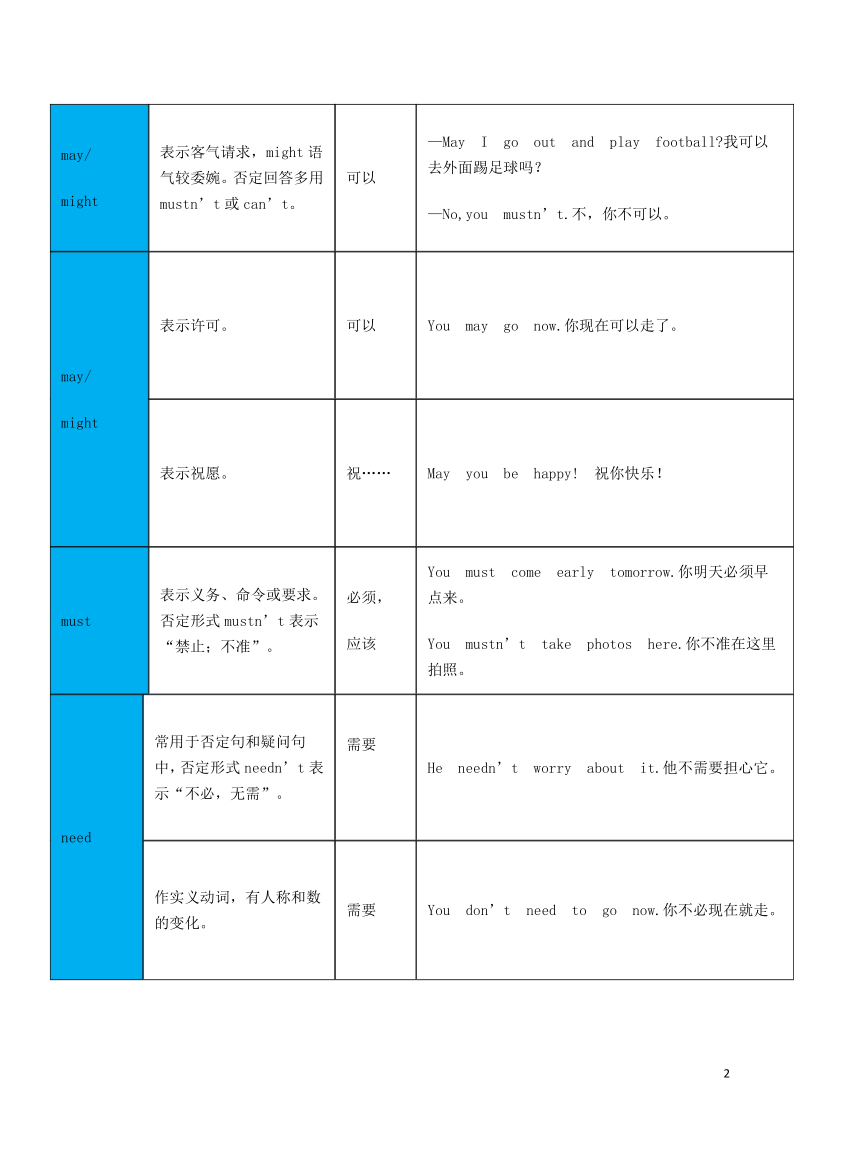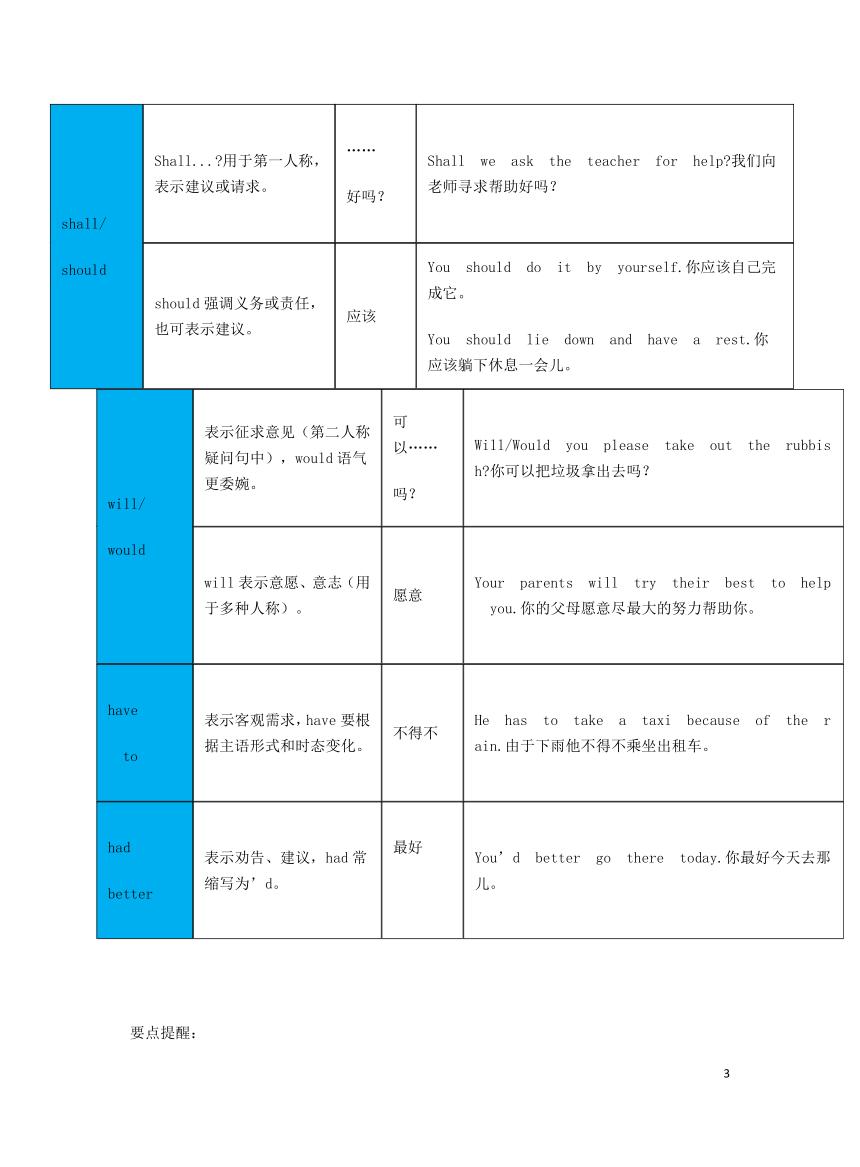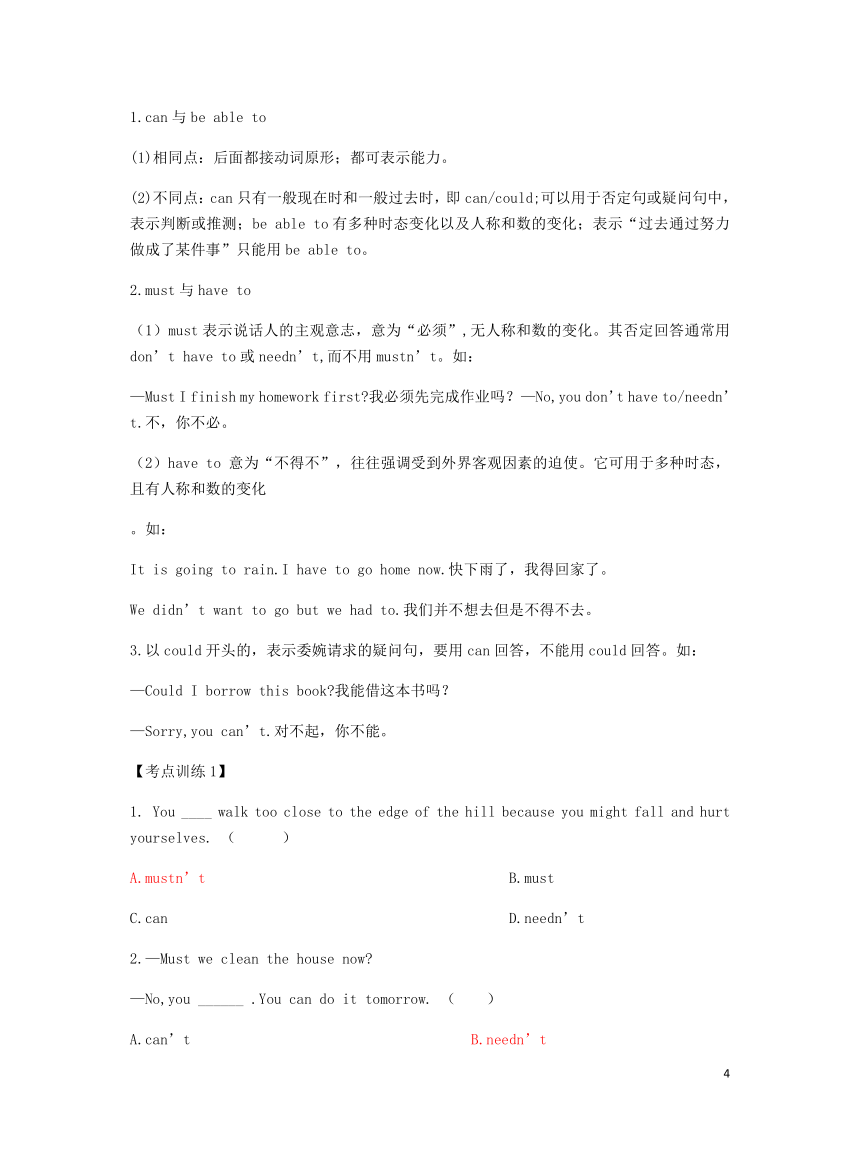外研版2023年中考英语知识归纳复习专题 情态动词
文档属性
| 名称 | 外研版2023年中考英语知识归纳复习专题 情态动词 |  | |
| 格式 | doc | ||
| 文件大小 | 56.0KB | ||
| 资源类型 | 教案 | ||
| 版本资源 | 外研版 | ||
| 科目 | 英语 | ||
| 更新时间 | 2023-04-27 16:43:52 | ||
图片预览




文档简介
情态动词
【情态动词】
情态动词表示说话者的情感、态度和语气,本身有一定的意义,但不能单独作谓语,须与动词原形一起构成句子的谓语。情态动词没有人称和数的变化。
情态动词的基本用法
情态动词 用法 含义 例句
can/could 表示能力(= be able to)。 能、会 Tom can swim.汤姆会游泳。I could ride the bike when I was 6 years old.当我六岁时,我会骑自行车。
(疑问句中)表示建议、请求。 可以 Can you give us a hand 你可以帮我们一下吗?
表示许可(相当于may)。 可以 You can watch TV on weekends.你可以在周末看电视。
may/might 表示客气请求,might语气较委婉。否定回答多用mustn’t或can’t。 可以 —May I go out and play football 我可以去外面踢足球吗?—No,you mustn’t.不,你不可以。
may/might 表示许可。 可以 You may go now.你现在可以走了。
表示祝愿。 祝…… May you be happy! 祝你快乐!
must 表示义务、命令或要求。否定形式mustn’t表示“禁止;不准”。 必须,应该 You must come early tomorrow.你明天必须早点来。You mustn’t take photos here.你不准在这里拍照。
need 常用于否定句和疑问句中,否定形式needn’t表示“不必,无需”。 需要 He needn’t worry about it.他不需要担心它。
作实义动词,有人称和数的变化。 需要 You don’t need to go now.你不必现在就走。
shall/should Shall... 用于第一人称,表示建议或请求。 ……好吗? Shall we ask the teacher for help 我们向老师寻求帮助好吗?
should强调义务或责任,也可表示建议。 应该 You should do it by yourself.你应该自己完成它。You should lie down and have a rest.你应该躺下休息一会儿。
will/would 表示征求意见(第二人称疑问句中),would语气更委婉。 可以……吗? Will/Would you please take out the rubbish 你可以把垃圾拿出去吗?
will表示意愿、意志(用于多种人称)。 愿意 Your parents will try their best to help you.你的父母愿意尽最大的努力帮助你。
have to 表示客观需求,have要根据主语形式和时态变化。 不得不 He has to take a taxi because of the rain.由于下雨他不得不乘坐出租车。
had better 表示劝告、建议,had常缩写为’d。 最好 You’d better go there today.你最好今天去那儿。
要点提醒:
1.can与be able to
(1)相同点:后面都接动词原形;都可表示能力。
(2)不同点:can只有一般现在时和一般过去时,即can/could;可以用于否定句或疑问句中,表示判断或推测;be able to有多种时态变化以及人称和数的变化;表示“过去通过努力做成了某件事”只能用be able to。
2.must与have to
(1)must表示说话人的主观意志,意为“必须”,无人称和数的变化。其否定回答通常用don’t have to或needn’t,而不用mustn’t。如:
—Must I finish my homework first 我必须先完成作业吗?—No,you don’t have to/needn’t.不,你不必。
(2)have to 意为“不得不”,往往强调受到外界客观因素的迫使。它可用于多种时态,且有人称和数的变化
。如:
It is going to rain.I have to go home now.快下雨了,我得回家了。
We didn’t want to go but we had to.我们并不想去但是不得不去。
3.以could开头的,表示委婉请求的疑问句,要用can回答,不能用could回答。如:
—Could I borrow this book 我能借这本书吗?
—Sorry,you can’t.对不起,你不能。
【考点训练1】
You ____ walk too close to the edge of the hill because you might fall and hurt yourselves. ( )
A.mustn’t B.must
C.can D.needn’t
2.—Must we clean the house now
—No,you ______ .You can do it tomorrow. ( )
A.can’t B.needn’t
C.shouldn’t D.mustn’t
3.—___ I use your ruler
—Sure.Here you are. ( )
A.Must B.May
C.Should D.Need
4.With the help of the new technology,you ___ e-mail your friends by mobile phone. ( )
A.can B.need
C.must D.might
5.—How was the youth club last night,Mark
—It was great fun.You ___ come. ( )
A.could B.must
C.may D.should
【情态动词表推测的用法情态】
动词 用法 含义 例句
can 常用于否定句或疑问句中。 can可能;can’t不可能 The boy can’t be Jim.He’s much taller.这个男孩不可能是吉姆。他要高很多。Who is knocking at the door Can it be the postman 谁在敲门?可能是邮差吗?
must 表示肯定的推测。 一定 Mr Li must be working now,for the light in his office is still on.李先生一定还在工作,因为他办公室的灯仍然亮着。
may/might 常用于肯定句中,might表示的可能性较小。 可能;也许 —Where are you going this summer vacation 这个暑假你打算去哪儿?—I might go to Beijing.But I’m not sure.我可能去北京,但我不确定。
注意:could表推测时,语气比can要弱,说话者留有余地。如:—Could it be an animal 它可能是动物吗?—It could not be,because it is not moving.不太可能,因为它不动。
【考点训练2】
1.—Is Tom coming by train
—He ___ drive his car.I’m not sure. ( )
A.can’t B.may
C.must D.need
2.—Listen! I think it ___ be Mr.White singing in the office.
—No.It ___ be him.He left for London just now. ( )
A.must;mustn’t B.may;mustn’t
C.must;can’t D.can;can’t
3.—Excuse me,is this the right way to the Children’s Palace
—Sorry,I’m not sure.But it ___ be. ( )
A.mustn’t B.might
C.can’t D.must
【中考示例】
(2017·广西)—Tony, ______ you sing English songs
—Yes,I can. ( )
A.can B.may C.need D.must
【解析】考查情态动词的用法。句意:——托尼,你会唱英文歌吗?——是的,我会。根据句意可知此处询问的是能力,应用can。
【考题热身】
1.(2017·云南)—I saw Susan in the library just now.
—No,it ___ be her.She went to Shanghai this morning.
( )
A.must B.can’t C.may D.needn’t
2.(2017·河北)I have travelled a lot.I ____ speak four languages. ( )
A.can B.may C.must D.need
3.(2017·安顺)—Must I stay here with you,Mum
—No,you ___ .You may go home now,but you ___ go to the net-bar. ( )
A.mustn’t;needn’t B.needn’t;mustn’t
C.must;need D.need;must
4.(2017·重庆B卷)—Robert,could you wash the car for me
—Yes,I ____ .I’m coming,dad. ( )
A.could B.couldn’t
C.can D.can’t
5.(2017·天津)When you are travelling,bring a map because it ___ help you. ( )
A.can’t B.mustn’t
C.used to D.may
6.(2017·苏州)Dogs ___ run through soccer games at the park.It’s dangerous! ( )
A.should B.shouldn’t
C.need D.needn’t
7.(2017·盐城)When a virus comes into our body,we get ill.The same thing ___ also happen to a computer.
( )
should B.need C.can D.must
8.(2017·上海)—___ I park my car here for a while
—No,you mustn’t.Do you see the sign “NO PARKING” ( )
A.Would B.May
C.Must D.Should
9.(2017·荆州)—Sixty dollars for such a T-shirt! You ____ be joking!
—I’m serious.It’s made of silk from Hangzhou.
( )
must B.need C.will D.can
10.(2017·阜康、米泉)—Look! The man at the gate ___ be our headmaster.He is always standing there every morning.
—No,it ___ be him.He is holding a meeting in the office now. ( )
A.must;can’t B.must;mustn’t
C.can’t;can’t D.can’t;mustn’t
PAGE
1
【情态动词】
情态动词表示说话者的情感、态度和语气,本身有一定的意义,但不能单独作谓语,须与动词原形一起构成句子的谓语。情态动词没有人称和数的变化。
情态动词的基本用法
情态动词 用法 含义 例句
can/could 表示能力(= be able to)。 能、会 Tom can swim.汤姆会游泳。I could ride the bike when I was 6 years old.当我六岁时,我会骑自行车。
(疑问句中)表示建议、请求。 可以 Can you give us a hand 你可以帮我们一下吗?
表示许可(相当于may)。 可以 You can watch TV on weekends.你可以在周末看电视。
may/might 表示客气请求,might语气较委婉。否定回答多用mustn’t或can’t。 可以 —May I go out and play football 我可以去外面踢足球吗?—No,you mustn’t.不,你不可以。
may/might 表示许可。 可以 You may go now.你现在可以走了。
表示祝愿。 祝…… May you be happy! 祝你快乐!
must 表示义务、命令或要求。否定形式mustn’t表示“禁止;不准”。 必须,应该 You must come early tomorrow.你明天必须早点来。You mustn’t take photos here.你不准在这里拍照。
need 常用于否定句和疑问句中,否定形式needn’t表示“不必,无需”。 需要 He needn’t worry about it.他不需要担心它。
作实义动词,有人称和数的变化。 需要 You don’t need to go now.你不必现在就走。
shall/should Shall... 用于第一人称,表示建议或请求。 ……好吗? Shall we ask the teacher for help 我们向老师寻求帮助好吗?
should强调义务或责任,也可表示建议。 应该 You should do it by yourself.你应该自己完成它。You should lie down and have a rest.你应该躺下休息一会儿。
will/would 表示征求意见(第二人称疑问句中),would语气更委婉。 可以……吗? Will/Would you please take out the rubbish 你可以把垃圾拿出去吗?
will表示意愿、意志(用于多种人称)。 愿意 Your parents will try their best to help you.你的父母愿意尽最大的努力帮助你。
have to 表示客观需求,have要根据主语形式和时态变化。 不得不 He has to take a taxi because of the rain.由于下雨他不得不乘坐出租车。
had better 表示劝告、建议,had常缩写为’d。 最好 You’d better go there today.你最好今天去那儿。
要点提醒:
1.can与be able to
(1)相同点:后面都接动词原形;都可表示能力。
(2)不同点:can只有一般现在时和一般过去时,即can/could;可以用于否定句或疑问句中,表示判断或推测;be able to有多种时态变化以及人称和数的变化;表示“过去通过努力做成了某件事”只能用be able to。
2.must与have to
(1)must表示说话人的主观意志,意为“必须”,无人称和数的变化。其否定回答通常用don’t have to或needn’t,而不用mustn’t。如:
—Must I finish my homework first 我必须先完成作业吗?—No,you don’t have to/needn’t.不,你不必。
(2)have to 意为“不得不”,往往强调受到外界客观因素的迫使。它可用于多种时态,且有人称和数的变化
。如:
It is going to rain.I have to go home now.快下雨了,我得回家了。
We didn’t want to go but we had to.我们并不想去但是不得不去。
3.以could开头的,表示委婉请求的疑问句,要用can回答,不能用could回答。如:
—Could I borrow this book 我能借这本书吗?
—Sorry,you can’t.对不起,你不能。
【考点训练1】
You ____ walk too close to the edge of the hill because you might fall and hurt yourselves. ( )
A.mustn’t B.must
C.can D.needn’t
2.—Must we clean the house now
—No,you ______ .You can do it tomorrow. ( )
A.can’t B.needn’t
C.shouldn’t D.mustn’t
3.—___ I use your ruler
—Sure.Here you are. ( )
A.Must B.May
C.Should D.Need
4.With the help of the new technology,you ___ e-mail your friends by mobile phone. ( )
A.can B.need
C.must D.might
5.—How was the youth club last night,Mark
—It was great fun.You ___ come. ( )
A.could B.must
C.may D.should
【情态动词表推测的用法情态】
动词 用法 含义 例句
can 常用于否定句或疑问句中。 can可能;can’t不可能 The boy can’t be Jim.He’s much taller.这个男孩不可能是吉姆。他要高很多。Who is knocking at the door Can it be the postman 谁在敲门?可能是邮差吗?
must 表示肯定的推测。 一定 Mr Li must be working now,for the light in his office is still on.李先生一定还在工作,因为他办公室的灯仍然亮着。
may/might 常用于肯定句中,might表示的可能性较小。 可能;也许 —Where are you going this summer vacation 这个暑假你打算去哪儿?—I might go to Beijing.But I’m not sure.我可能去北京,但我不确定。
注意:could表推测时,语气比can要弱,说话者留有余地。如:—Could it be an animal 它可能是动物吗?—It could not be,because it is not moving.不太可能,因为它不动。
【考点训练2】
1.—Is Tom coming by train
—He ___ drive his car.I’m not sure. ( )
A.can’t B.may
C.must D.need
2.—Listen! I think it ___ be Mr.White singing in the office.
—No.It ___ be him.He left for London just now. ( )
A.must;mustn’t B.may;mustn’t
C.must;can’t D.can;can’t
3.—Excuse me,is this the right way to the Children’s Palace
—Sorry,I’m not sure.But it ___ be. ( )
A.mustn’t B.might
C.can’t D.must
【中考示例】
(2017·广西)—Tony, ______ you sing English songs
—Yes,I can. ( )
A.can B.may C.need D.must
【解析】考查情态动词的用法。句意:——托尼,你会唱英文歌吗?——是的,我会。根据句意可知此处询问的是能力,应用can。
【考题热身】
1.(2017·云南)—I saw Susan in the library just now.
—No,it ___ be her.She went to Shanghai this morning.
( )
A.must B.can’t C.may D.needn’t
2.(2017·河北)I have travelled a lot.I ____ speak four languages. ( )
A.can B.may C.must D.need
3.(2017·安顺)—Must I stay here with you,Mum
—No,you ___ .You may go home now,but you ___ go to the net-bar. ( )
A.mustn’t;needn’t B.needn’t;mustn’t
C.must;need D.need;must
4.(2017·重庆B卷)—Robert,could you wash the car for me
—Yes,I ____ .I’m coming,dad. ( )
A.could B.couldn’t
C.can D.can’t
5.(2017·天津)When you are travelling,bring a map because it ___ help you. ( )
A.can’t B.mustn’t
C.used to D.may
6.(2017·苏州)Dogs ___ run through soccer games at the park.It’s dangerous! ( )
A.should B.shouldn’t
C.need D.needn’t
7.(2017·盐城)When a virus comes into our body,we get ill.The same thing ___ also happen to a computer.
( )
should B.need C.can D.must
8.(2017·上海)—___ I park my car here for a while
—No,you mustn’t.Do you see the sign “NO PARKING” ( )
A.Would B.May
C.Must D.Should
9.(2017·荆州)—Sixty dollars for such a T-shirt! You ____ be joking!
—I’m serious.It’s made of silk from Hangzhou.
( )
must B.need C.will D.can
10.(2017·阜康、米泉)—Look! The man at the gate ___ be our headmaster.He is always standing there every morning.
—No,it ___ be him.He is holding a meeting in the office now. ( )
A.must;can’t B.must;mustn’t
C.can’t;can’t D.can’t;mustn’t
PAGE
1
同课章节目录
- 词法
- 名词
- 动词和动词短语
- 动词语态
- 动词时态
- 助动词和情态动词
- 非谓语动词
- 冠词
- 代词
- 数词和量词
- 形容词副词及其比较等级
- 介词和介词短语
- 连词和感叹词
- 构词法
- 相似、相近词比较
- 句法
- 陈述句
- 一般疑问句和否定疑问句
- 特殊疑问句及选择疑问句
- 反意疑问句
- 存在句(There be句型)
- 宾语从句
- 定语从句
- 状语从句
- 主谓一致问题
- 简单句
- 并列句
- 复合句
- 主谓一致
- 主、表语从句
- 名词性从句
- 直接引语和间接引语
- 虚拟语气
- 感叹句
- 强调句
- 倒装句
- 祈使句
- 句子的成分
- 句子的分类
- 题型专区
- 单项选择部分
- 易错题
- 完形填空
- 阅读理解
- 词汇练习
- 听说训练
- 句型转换
- 补全对话
- 短文改错
- 翻译
- 书面表达
- 任务型阅读
- 语法填空
- 其他资料
